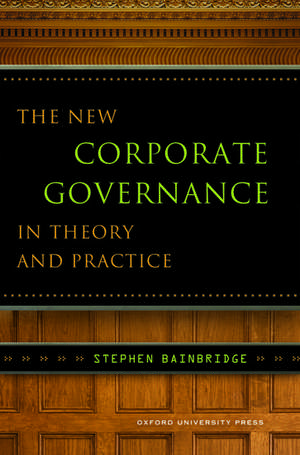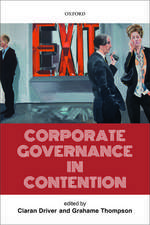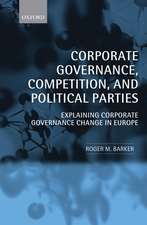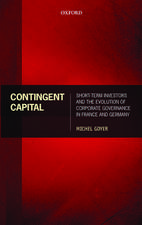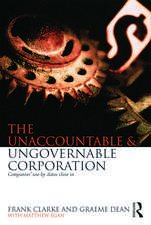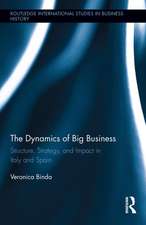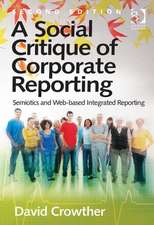The New Corporate Governance in Theory and Practice
Autor Stephen Bainbridgeen Limba Engleză Hardback – 14 aug 2008
Preț: 498.71 lei
Preț vechi: 753.32 lei
-34% Nou
Puncte Express: 748
Preț estimativ în valută:
95.43€ • 99.90$ • 78.96£
95.43€ • 99.90$ • 78.96£
Carte tipărită la comandă
Livrare economică 26 martie-01 aprilie
Preluare comenzi: 021 569.72.76
Specificații
ISBN-13: 9780195337501
ISBN-10: 0195337506
Pagini: 264
Ilustrații: 3 line
Dimensiuni: 234 x 155 x 20 mm
Greutate: 0.5 kg
Editura: Oxford University Press
Colecția OUP USA
Locul publicării:New York, United States
ISBN-10: 0195337506
Pagini: 264
Ilustrații: 3 line
Dimensiuni: 234 x 155 x 20 mm
Greutate: 0.5 kg
Editura: Oxford University Press
Colecția OUP USA
Locul publicării:New York, United States
Recenzii
The phenomenon that lies at the heart of this book - which Stephen Bainbridge describes as 'director primacy' - is both real and important. Directors now exercise control over most corporations in a way that directors did not just a few decades ago, and while this director-centered governance structure has been embedded in corporation statutes from the advent of general corporation laws in the 1800s, prior to the 1970s most corporations in the United States combined imperial managers with compliant boards of directors. Bainbridge tells the back story on this 'transformation of corporate governance from managerialism to director primacy,' which is an important aspect of his theory because it supports the view that corporate law has evolved to an efficient state. He offers an updated and comprehensive statement of his theory that will become one of the touchstones of corporate governance debates for many years." D. Gordon Smith Glen L. Farr Professor of Law, Brigham Young University
Stephen M. Bainbridge's book is a welcome and timely clarification of the truly important issues in the current debate over the governance structure of American corporations. Bainbridge marshals historical, theoretical and practical reasons to explain why the central role in corporate governance has always been assigned to the board of directors and should continue to be. In doing so, Bainbridge demonstrates the weaknesses in the claims of a small group of institutional investors (mainly state pension funds and labor unions) for a larger role in the management of American businesses. While Bainbridge's arguments are sophisticated, his presentation is straight-forward and easy to follow. This is an important book that should command the attention of anyone interested in corporate governance, whether specialist or layperson." Michael P. Dooley William S. Potter Professor of Law, University of Virginia
Stephen M. Bainbridge's book is a welcome and timely clarification of the truly important issues in the current debate over the governance structure of American corporations. Bainbridge marshals historical, theoretical and practical reasons to explain why the central role in corporate governance has always been assigned to the board of directors and should continue to be. In doing so, Bainbridge demonstrates the weaknesses in the claims of a small group of institutional investors (mainly state pension funds and labor unions) for a larger role in the management of American businesses. While Bainbridge's arguments are sophisticated, his presentation is straight-forward and easy to follow. This is an important book that should command the attention of anyone interested in corporate governance, whether specialist or layperson." Michael P. Dooley William S. Potter Professor of Law, University of Virginia
Notă biografică
Stephen Bainbridge is the William D. Warren Professor of Law at UCLA, where he currently teaches Business Associations, Unincorporated Business Associations, and Advanced Corporation Law. He previously taught at the University of Illinois Law School, where he received the 'Best Instructor Award' from the Class of 1990. He also taught at the Harvard Law School, La Trobe University in Melbourne, Australia, and at the Aoyama Gakuin University in Tokyo. Professor Bainbridge has published several books and over 50 law review articles on a variety of topics, but with a strong emphasis on the law and economics of public corporations. He currently serves on the Editorial Advisory Board of the Journal of Markets and Morality and the Executive Committee of the Federalist Society's Corporations, Securities, & Antitrust Group.
